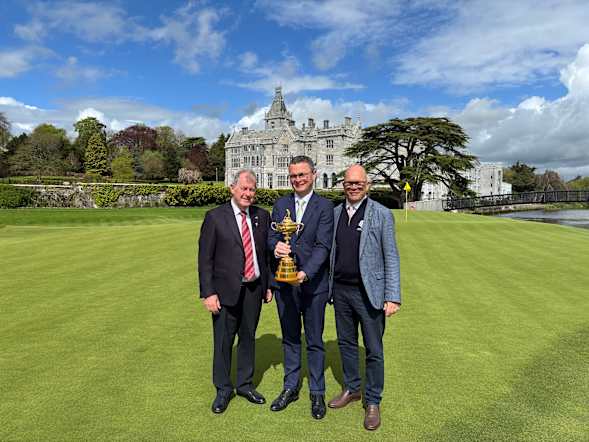
Ryder Cup 101: Everything you need to know about 44th Ryder Cup
The 44th Ryder Cup gets underway Friday at Marco Simone Golf and Country Club outside of Rome.
Here’s everything you need to know:
What is the Ryder Cup?
The Ryder Cup is an international team match-play competition that is traditionally held biennially, or once every two years. Initially, the event, which began in 1927, matched up two teams, one from the U.S. and the other from Great Britain. In 1973, the Great Britain Team was officially changed to Great Britain and Ireland, though Irish players had played prior to that. Then in 1979, the GB&I squad was expanded to include players from continental Europe, which is what we see today: U.S. vs. Europe.
• • •
How many players are on each team, and how were they determined?
Each team consists of 12 players. The way each of them are selected has varied through the years, but for the 2023 Matches in Rome, each team consisted of six automatic qualifiers and six Captain’s picks. The U.S. Team’s automatic qualifiers come from the U.S. points standings while Europe uses two points standings, European and World points, with three players coming off of each list.
• • •
What’s the schedule of events for 2023?
Official practice runs Tuesday-Thursday with the Opening Ceremony scheduled for 4 p.m. local time. The Ryder Cup gets underway on Friday, and over the next three days five sessions are contested, two each (one morning foursomes and one afternoon four-ball) on Friday and Saturday and one singles session on Sunday. Four foursomes and four four-ball matches are played each of the first two days while Sunday features 12 singles matches.
for the full schedule.
• • •
How and when can I watch?
The Ryder Cup will be broadcast in the U.S. on NBC, USA, GOLF Channel and Peacock beginning Wednesday:
Wednesday – Ryder Cup All-Star Match, 6:30 a.m.-9:30 a.m. ET (Peacock)
Thursday – Junior Ryder Cup, 4:30 a.m.-7:30 a.m. ET (GOLF, Peacock); Opening Ceremony, 10 a.m.-1 p.m. ET
Friday – Foursomes and four-ball sessions, 1:30 a.m.-Noon ET (USA, Peacock); Featured match (foursomes), 1:30 a.m.-conclusion (Peacock); Featured match (four-ball), 6:20 a.m.-conclusion (Peacock)
Saturday – Foursomes and four-ball sessions, 1:30 a.m.-3 a.m. ET (USA) and 3 a.m.-Noon ET (NBC); Re-air, Noon-6 p.m. ET (NBC, Peacock); Featured match (foursomes), 1:30 a.m.-conclusion (Peacock); Featured match (four-ball), 7 a.m.-conclusion (Peacock)
Sunday – Singles session, 5:30 a.m.-1 p.m. ET (NBC, Peacock); Featured match (singles), TBD
for full and most updated TV schedule.
• • •
How is the Ryder Cup scored, and how many does a team need to win?
There are 28 matches played in the Ryder Cup with 28 points up for grabs. Each match win is worth a full point while half-points are awarded for ties. Unlike stroke play, match play involves a player or two players from each team competing against each other. If one side scores lower on a hole, it wins that hole. Winning the most holes wins the match and a point. Two examples of final scores: 1 UP, a player finished 18 holes having won one more hole than his opponent; 3&2, a player had won three more holes than his opponent with two holes to play. The first team to 14 ½ points wins the Cup. In the event of a 14-14 tie, the previous Ryder Cup winning team retains the Cup. Even once a team clinches, all the matches continue on until each is complete and a final tally is made.
• • •
How do the different formats work?
In foursomes, the teams consist of two players, who alternate hitting shots. So, on the first hole, Player A will tee off, Player B will hit the second shot, and they will alternate from there until the hole is completed. Player B would then tee off on No. 2 and the subsequent even holes. In four-balls, the teams also consist of two players, though each player plays his own ball, and the team takes the lower score of the two players on each hole. In singles, players play traditional match play.
• • •
Why aren’t some players putting out on a hole?
These are called concessions. Unlike stroke play, players don't have to complete each hole in match play. If a player concedes a stroke – almost always a putt – to his opponent, the opponent picks up his ball, takes the score he would have made on the next stroke and moves on to the next hole.
• • •
Why are some matches ending before the 18th hole?
Once a player is leading by more than the amount of holes remaining, the match ends. For example, if one player is 3 UP with two holes to play, the match is over because the other play cannot possibly tie or win the match.
• • •
Who plays when, and how is that decided?
Each of the team’s Captain’s fill out their lineups for each session in a blind-draw format, which means the opposing Captain does not know which players and which order the other Captain has picked for each session. With just four matches and eight players per side competing in each of the first four sessions, four players will be sitting per team on any given session until singles, when all 24 players compete.
• • •
Which team has won the most Ryder Cups?
The U.S. is 27-14-2 all-time in Ryder Cups. The Americans won the last edition at Whistling Straits, 19-9, though Europe hasn’t lost on home soil since 1993.
• • •
What’s the record for margin of victory?
Though fewer points were available back in the day, the Americans’ ten-point triumph in Wisconsin in 2021 is the modern record for winning margin.
• • •
What are the teams playing for? For their country. No money is on the line, only pride.



